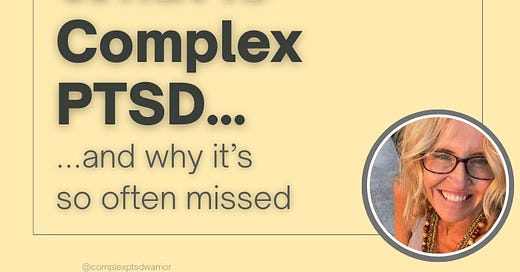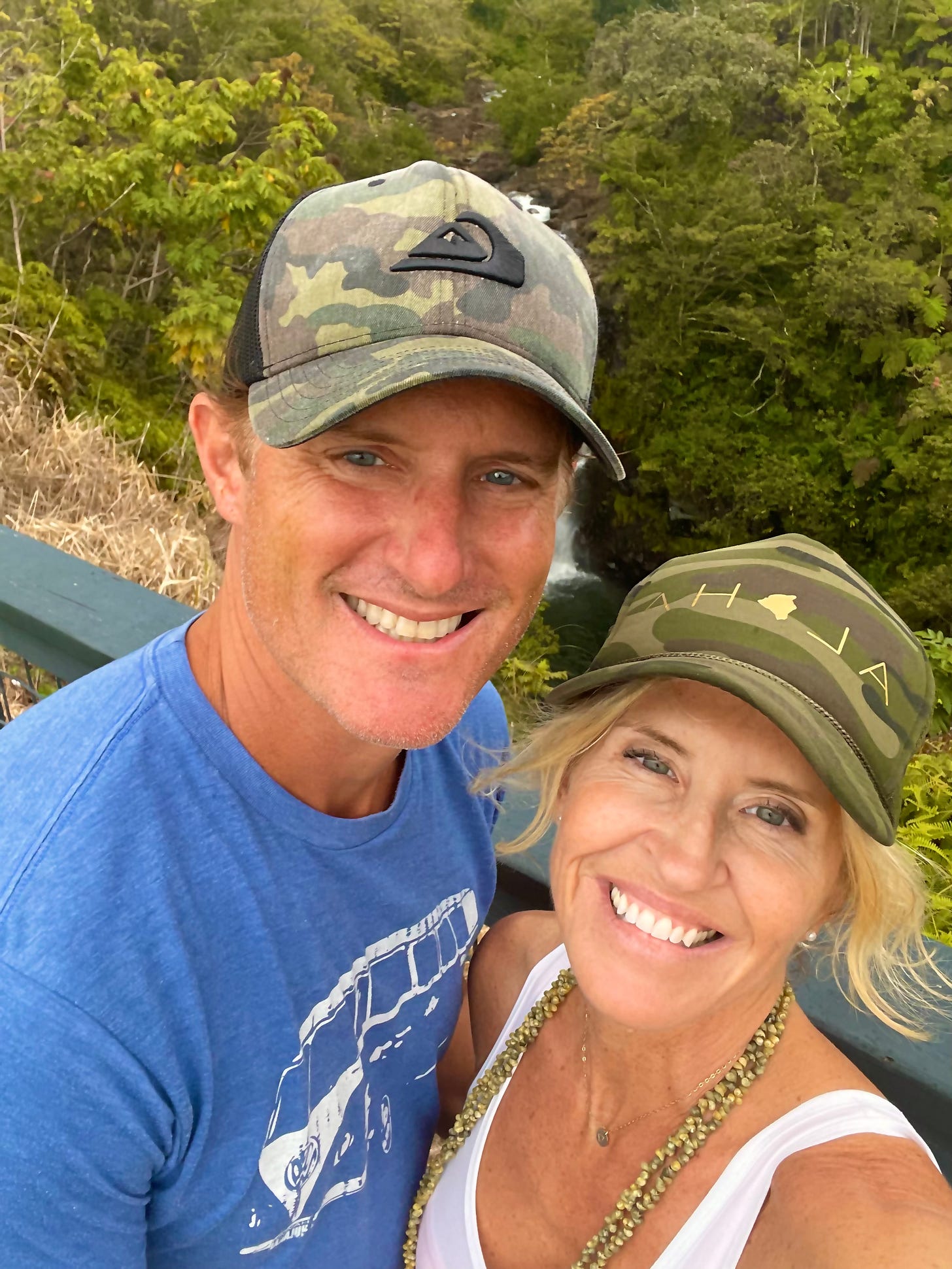What Is Complex PTSD — and Why It’s So Often Missed
The trauma diagnosis that doesn’t always show up in your chart — but lives in your body, your patterns, and your past.
📚Summary
Complex PTSD isn’t just something that happened to you — it’s something your body and nervous system are still carrying.
In this post, we’ll break down what Complex PTSD really is, how it differs from traditional PTSD, why so many survivors (and even therapists) miss it, and how it quietly shapes your relationships, emotions, and sense of safety.
If you’ve ever felt “too much,” emotionally reactive, or just… broken — this may help you understand why.
Have you ever felt like something was off — but couldn’t explain what?
Maybe your reactions feel “too big.”
Or you shut down when things get intense.
Or you’re constantly trying to keep everyone else comfortable — even if it costs you everything.
You’ve tried to push through. Maybe you’ve even been in therapy.
But deep down, you still wonder: Why do I feel like this?
If that sounds familiar… you’re not alone.
You may be living with something called Complex PTSD — a trauma response that often goes undiagnosed, misdiagnosed, or completely missed.
Let’s break it down.
What Is Complex PTSD?
Complex PTSD (C-PTSD) is a form of post-traumatic stress that develops from long-term, repeated trauma, often in childhood.
Instead of one single traumatic event, it’s the ongoing experience of being unsafe — emotionally, physically, or psychologically — over time.
This might include:
Growing up with an emotionally unavailable or unpredictable parent
Living in a household where love was conditional or inconsistent
Ongoing bullying, neglect, or chaos
Being around addiction, rage, or untreated mental illness
Never having a safe space to express your emotions
Your nervous system learns to adapt to that environment — by staying in survival mode.
Even decades later, your body might still be reacting like the danger never ended.
CPTSD vs PTSD — Why the Distinction Matters
Most people are familiar with PTSD: a response to a single traumatic event like an assault, accident, or natural disaster.
CPTSD is different. It’s not one event — it’s a pattern. A prolonged lack of safety.
Especially in relationships that were supposed to protect you.
That distinction matters, because:
PTSD often shows up as fear-based flashbacks, nightmares, or avoidance
C-PTSD can show up as:
Shame that doesn’t go away
Emotional flashbacks with no clear memory attached (we will break these down next week)
Deep self-doubt and feelings of being “too much”
People-pleasing, perfectionism, or emotional numbness
Chronic anxiety and difficulty trusting others
Trouble regulating emotions — even in low-stress situations
And here’s the hard part: you might not even realize it’s trauma. MANY people don’t.
Why You Might Not Know You Have It
C-PTSD doesn’t always look dramatic.
It often hides in your habits, your inner dialogue, and your relationships.
You might think:
“This is just my personality”
“I guess I’m just anxious / needy / moody”
“Maybe I’m just bad at life”
But here’s the truth:
❌ You're not broken
❌ You're not overreacting
❌ You're not making it up
These could all be adaptations — protective responses your brain and body developed to survive overwhelming stress.
We just didn’t have the language for it growing up.
Most of us learned to suppress, minimize, or blame ourselves for what we were feeling.
Why Doctors and Therapists Often Miss It
Complex PTSD isn’t yet recognized in the DSM-5 (used in the U.S.), but it is officially included in the WHO’s ICD-11 (ICD-11) diagnostic manual — thanks in large part to the work of psychiatrist Dr. Judith Herman, who first coined the term in the 1990s.
That means many mental health providers:
Don’t screen for it
Aren’t trained to recognize it
May misdiagnose it as something else
Common misdiagnoses include:
Generalized Anxiety Disorder
Major Depression
Bipolar Disorder
ADHD
Borderline Personality Disorder
And while there can be overlap, these diagnoses often miss the root cause: relational trauma.
That’s why many people bounce between labels and treatments — but still feel stuck.
Complex PTSD requires a different kind of care — one that focuses not just on symptoms, but on rebuilding safety, emotional regulation, and trust in relationships.
Without that deeper, trauma-informed approach, healing can feel like a revolving door.
You’re Not Alone — And You’re Not Broken
If anything in this post feels painfully familiar — please know:
💛 It’s not just you.
💛 It’s not your fault.
💛 And it can get better.
Complex PTSD can be invisible to others — but it shapes everything from your nervous system to your sense of self.
And once you can name it, you can start healing it.
If this resonated with you...
I’d love to have you stick around.
Subscribe for FREE below for future posts — real stories, gentle reminders, and practical tools I teach (and use) for feeling safe in your mind & body.
Subscribe below and receive:
FREE: Complex PTSD Get Grounded Guide- 5 Grounding Techniques for Emotional Flashbacks
Simple, trauma-informed tools to help you calm your body and move through emotional flashbacks.
Next up:
On Friday, We’ll explore how C-PTSD actually shows up in your daily life — and what healing can start to look like.
Until then, you’re not too much. You’re not imagining it.
And most importantly, you don’t have to go through this alone.
📌 Save this post for when you start questioning yourself again
💬 Drop a comment if this helped you feel seen
📲 Share this with someone who might need to hear these words
📌 About Us:
We’re Kristin & Travis Francis — founders of Complex PTSD Warrior. We provide trauma-informed education & support for healing your nervous system, repairing relationships, and breaking generational cycles — with curated tools based in neuroscience & lived C-PTSD experience
Our mission is to spread Complex PTSD Awareness, Education & Tools around the world.
If this post helped you feel seen, understood, or less alone — we’d be so grateful if you’d share it with someone who might need it too.
It could be the message they’ve been waiting their whole life to hear.
Disclaimer: The content shared here is for educational and informational purposes only and is not a substitute for professional mental health care, diagnosis, or treatment. Please go at your own pace, and always prioritize what feels safe for your body and nervous system. If you’re in crisis or need immediate support, please reach out to a licensed mental health provider or crisis resource in your area.





This hit a nail on the head for me. For years I wondered why I handled some things with ease and other times I just plain went off the rails. When I was younger I blamed hormones. But the older I got , the worse I became. Emotional regulation was not my wheelhouse. I bounced around a few therapists in my late 50's and researching on my own. I had family tell me they thought I was bi polar or BPD. I felt like I didn't meet the criteria for either diagnosis. I tried anti depressants but they did not help. Then I found a new therapist after the death of one of my kids. She was the first to ask me to take the ACES test. I scored a 10. So we began dealing with my guilt and shame. So much shame. She brought up CPTSD and finally I felt seen and heard. I still have a long way to go but I do see a little dot of light at the end of that tunnel. A good therapist finds a way to meet you where you are
I know I have C- PTSD, among many other things and was wondering if by chance you know anyone in Western NY that takes these kind of patients? Cannot find anyone. Getting semi desperate…